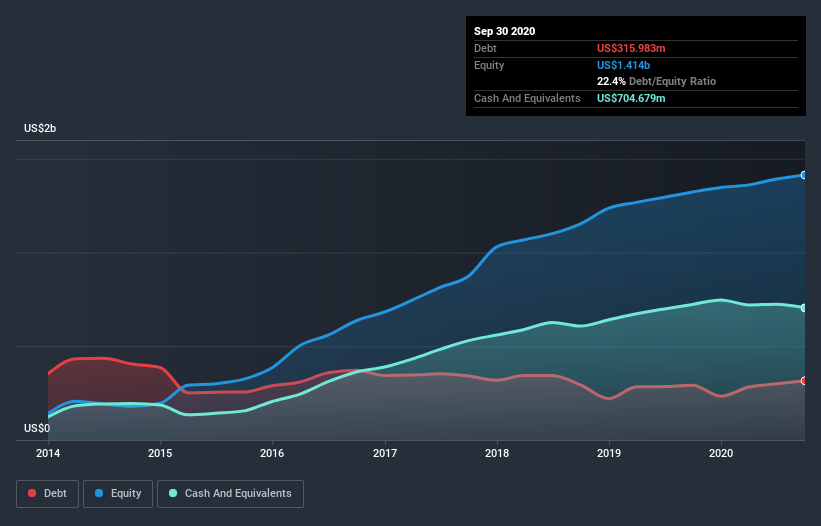- United States
- /
- Semiconductors
- /
- NasdaqGS:TSEM
We Think Tower Semiconductor (NASDAQ:TSEM) Can Stay On Top Of Its Debt
Some say volatility, rather than debt, is the best way to think about risk as an investor, but Warren Buffett famously said that 'Volatility is far from synonymous with risk.' So it might be obvious that you need to consider debt, when you think about how risky any given stock is, because too much debt can sink a company. Importantly, Tower Semiconductor Ltd. (NASDAQ:TSEM) does carry debt. But is this debt a concern to shareholders?
When Is Debt A Problem?
Generally speaking, debt only becomes a real problem when a company can't easily pay it off, either by raising capital or with its own cash flow. In the worst case scenario, a company can go bankrupt if it cannot pay its creditors. While that is not too common, we often do see indebted companies permanently diluting shareholders because lenders force them to raise capital at a distressed price. Of course, the upside of debt is that it often represents cheap capital, especially when it replaces dilution in a company with the ability to reinvest at high rates of return. When we think about a company's use of debt, we first look at cash and debt together.
See our latest analysis for Tower Semiconductor
How Much Debt Does Tower Semiconductor Carry?
As you can see below, Tower Semiconductor had US$237.9m of debt at September 2020, down from US$291.7m a year prior. But on the other hand it also has US$704.7m in cash, leading to a US$466.8m net cash position.

How Strong Is Tower Semiconductor's Balance Sheet?
The latest balance sheet data shows that Tower Semiconductor had liabilities of US$258.8m due within a year, and liabilities of US$312.3m falling due after that. On the other hand, it had cash of US$704.7m and US$118.1m worth of receivables due within a year. So it can boast US$251.7m more liquid assets than total liabilities.
This surplus suggests that Tower Semiconductor has a conservative balance sheet, and could probably eliminate its debt without much difficulty. Succinctly put, Tower Semiconductor boasts net cash, so it's fair to say it does not have a heavy debt load!
The modesty of its debt load may become crucial for Tower Semiconductor if management cannot prevent a repeat of the 29% cut to EBIT over the last year. Falling earnings (if the trend continues) could eventually make even modest debt quite risky. When analysing debt levels, the balance sheet is the obvious place to start. But it is future earnings, more than anything, that will determine Tower Semiconductor's ability to maintain a healthy balance sheet going forward. So if you want to see what the professionals think, you might find this free report on analyst profit forecasts to be interesting.
Finally, a company can only pay off debt with cold hard cash, not accounting profits. While Tower Semiconductor has net cash on its balance sheet, it's still worth taking a look at its ability to convert earnings before interest and tax (EBIT) to free cash flow, to help us understand how quickly it is building (or eroding) that cash balance. Over the most recent three years, Tower Semiconductor recorded free cash flow worth 66% of its EBIT, which is around normal, given free cash flow excludes interest and tax. This cold hard cash means it can reduce its debt when it wants to.
Summing up
While we empathize with investors who find debt concerning, you should keep in mind that Tower Semiconductor has net cash of US$466.8m, as well as more liquid assets than liabilities. And it impressed us with free cash flow of US$20m, being 66% of its EBIT. So we are not troubled with Tower Semiconductor's debt use. When analysing debt levels, the balance sheet is the obvious place to start. But ultimately, every company can contain risks that exist outside of the balance sheet. Take risks, for example - Tower Semiconductor has 2 warning signs we think you should be aware of.
When all is said and done, sometimes its easier to focus on companies that don't even need debt. Readers can access a list of growth stocks with zero net debt 100% free, right now.
If you decide to trade Tower Semiconductor, use the lowest-cost* platform that is rated #1 Overall by Barron’s, Interactive Brokers. Trade stocks, options, futures, forex, bonds and funds on 135 markets, all from a single integrated account. Promoted
Valuation is complex, but we're here to simplify it.
Discover if Tower Semiconductor might be undervalued or overvalued with our detailed analysis, featuring fair value estimates, potential risks, dividends, insider trades, and its financial condition.
Access Free AnalysisThis article by Simply Wall St is general in nature. It does not constitute a recommendation to buy or sell any stock, and does not take account of your objectives, or your financial situation. We aim to bring you long-term focused analysis driven by fundamental data. Note that our analysis may not factor in the latest price-sensitive company announcements or qualitative material. Simply Wall St has no position in any stocks mentioned.
*Interactive Brokers Rated Lowest Cost Broker by StockBrokers.com Annual Online Review 2020
Have feedback on this article? Concerned about the content? Get in touch with us directly. Alternatively, email editorial-team@simplywallst.com.
About NasdaqGS:TSEM
Tower Semiconductor
An independent semiconductor foundry, provides technology, development, and process platforms for integrated circuits in the United States, Japan, rest of Asia, and Europe.
Flawless balance sheet with reasonable growth potential.
Similar Companies
Market Insights
Community Narratives


Recently Updated Narratives

Constellation Energy Dividends and Growth

CoreWeave's Revenue Expected to Rocket 77.88% in 5-Year Forecast

Bisalloy Steel Group will shine with a projected profit margin increase of 12.8%
Popular Narratives


MicroVision will explode future revenue by 380.37% with a vision towards success


NVDA: Expanding AI Demand Will Drive Major Data Center Investments Through 2026



